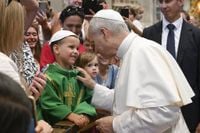On August 20, 2025, Pope Leo XIV stood before a sea of faces in the Vatican’s Paul VI Audience Hall, his words echoing across the marble and into the hearts of the 6,000 pilgrims gathered from every corner of the globe. His message, however, was not reserved only for those present. It was a clarion call to Catholics—and indeed, all people of faith—everywhere: Friday, August 22, the Memorial of the Queenship of the Blessed Virgin Mary, would be a day of prayer and fasting for peace in a world still battered by war.
"Mary is the Mother of believers here on earth, and is also invoked as Queen of Peace, while our earth continues to be wounded by wars in the Holy Land, in Ukraine, and in many other regions of the world," the Pope said, according to Catholic News Agency. His voice, gentle but resolute, carried a plea: "I invite all the faithful to devote the day of 22 August to fasting and prayer, imploring the Lord to grant us peace and justice, and to dry the tears of those who suffer as a result of the ongoing armed conflicts. Mary, Queen of Peace, intercede so that peoples may find the path to peace."
The appeal, delivered during his weekly General Audience and amplified across social media and news outlets such as UPI and Catholic News Service, specifically referenced the ongoing wars in Ukraine and the Holy Land. The Pope’s message was clear: while diplomats and politicians work for solutions, the faithful are called to spiritual action—prayer, fasting, and solidarity with the suffering.
This is not the first time Pope Leo XIV has spoken out against the scourge of war. Since the very start of his papacy, he has made repeated appeals for peace in Ukraine, including a personal phone call and a face-to-face meeting with Ukrainian President Volodymyr Zelenskiy in July 2025, as reported by the Associated Press. He has also kept in regular contact with global leaders, though he’s remained discreet about the specifics. When asked by reporters outside the Villa Barberini in Castel Gandolfo on August 19 whether he had spoken with U.S. President Donald Trump or other leaders following recent diplomatic meetings, the Pope replied, "I hear from some of them from time to time," but offered no further details.
His sense of hope is cautious but sincere. "There is hope. We still have to work hard, pray hard and seek the way forward," he told journalists, acknowledging that while diplomatic moves are encouraging, much remains to be done. The Pope’s 100th day in office, marked on August 16, was described by him as "a blessing from God." He added, "I receive so much. I really believe in the Lord's grace, and I am so thankful for the reception I have received."
The upcoming day of prayer and fasting falls on the feast of the Queenship of Mary, a liturgical commemoration that holds special significance for Catholics. The Pope explained the timing: "While our world continues to be wounded by wars in the Holy Land, in Ukraine and in many other regions of the world, I ask all the faithful to spend Aug. 22 in fasting and prayer, asking the Lord to grant us peace and justice and to dry the tears of those who suffer because of the armed conflicts underway."
He further invoked Mary, Queen of Peace, to intercede so that "people would find the path of peace." The symbolism is potent: Mary, revered as the Queen of Peace, stands as a spiritual beacon for those seeking an end to violence and bloodshed. The Pope’s call, then, is more than ritual—it’s a deeply felt plea for the world to turn toward mercy and reconciliation.
Within the Catholic community, the Pope’s message has found a receptive audience. Earlier this summer, Bishop Earl Boyea of the Diocese of Lansing urged his flock to offer prayer, fasting, and thanksgiving every Friday in June for peace in the Holy Land, an initiative publicly commended by Cardinal Pierbattista Pizzaballa, the Latin Patriarch of Jerusalem. The Pope’s August 22 call builds on this momentum, extending the invitation to Catholics worldwide and encouraging unity in the face of division.
During his catechesis on August 20, Pope Leo XIV also spoke powerfully about forgiveness, drawing from the example of Jesus Christ during the betrayal by Judas Iscariot. "Jesus knew that his hour had come to pass ... he loved them to the end," the Pope reflected, referencing the Gospel of John. "To love until the end: Here is the key to understanding Christ’s heart. A love that does not cease in the face of rejection, disappointment, even ingratitude."
He continued, "Instead of withdrawing, accusing, defending himself ... he continues to love: He washes the feet, dips the bread and offers it." The Pope’s words underscored the radical nature of forgiveness: "He knows that true forgiveness does not await repentance but offers itself first, as a free gift, even before it is accepted." For Pope Leo XIV, forgiveness is not weakness, nor is it forgetfulness. Rather, it is "the true face of hope" and the foundation for peace. "It is the ability to set the other free, while loving him to the end. Jesus’ love does not deny the truth of pain, but it does not allow evil to have the last word."
After his catechesis, the Pope spent more than an hour greeting pilgrims, imparting his apostolic blessing, and sharing a condensed version of his message in Italian, Spanish, and English. His engagement with the faithful was both pastoral and personal—a reminder that, even in the face of global conflict, the Church’s mission is rooted in compassion and human connection.
The call for fasting and prayer on August 22 is not limited to Catholics. Pope Leo XIV explicitly invited "Catholics and other religious faithful" to join in the observance, recognizing that the yearning for peace transcends denominational lines. As reported by UPI, he used social media to broaden the invitation, urging all people of goodwill to take part in the day of spiritual solidarity.
As the world prepares for August 22, the Pope’s message resonates: peace is not merely the absence of war, but the presence of justice, forgiveness, and hope. In his words and actions, Pope Leo XIV continues to urge the global community to walk the difficult path toward reconciliation, trusting that even small acts—like a day of prayer and fasting—can help dry the tears of those who suffer and open the door to a more peaceful tomorrow.
In a world still shadowed by violence, the Pope’s invitation is a reminder that hope, like peace, begins in the human heart—and that every prayer, every act of mercy, matters.


